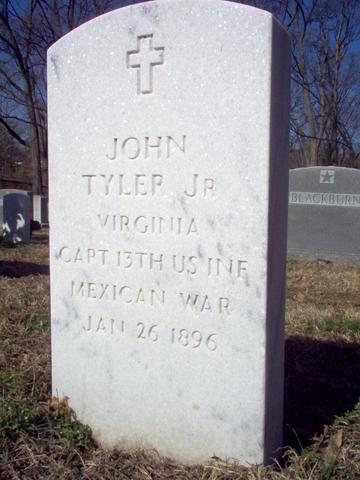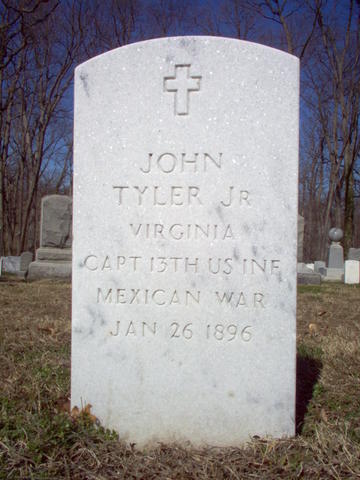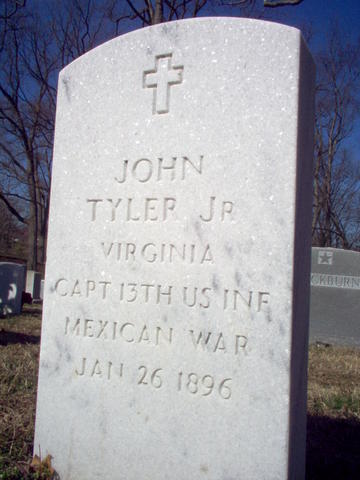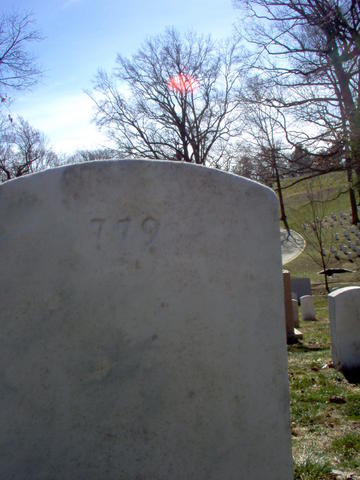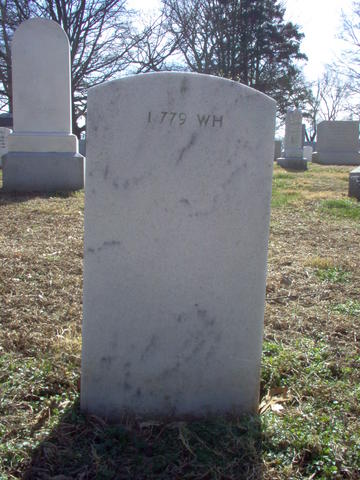John Tyler Jr. of Virginia
Appointed from Virginia, Captain of Infantry, 6 March 1847
Resigned 28 May 1847
Colonel, Confederate States of America, Civil War, 1861 to 1865
Died 26 January 1896
John Tyler, Jr.
He was born April 27, 1819 and died January 26, 1896. He was the son of John Tyler, President of the Unitd States, and Letitia Christian Tyler.
He was famous for defending his father in a much-publicized duel with a Richmond newspaper.
John Jr. was a writer, lawyer and politician who was not successful as any of the three. He became an alcoholic.
John, Jr. married Martha “Mattie” Rochelle, but lived with her only a few months before trying to get a divorce, yet they had three children together. She was born in Virginia in 1820 and died in 1867.
John Tyler, President from 1841-1845, had two wives. Both were First Ladies, and between them had fifteen children, which is still the record for presidential children. Fourteen of these children lived to maturity.
John Tyler, Jr., 1819-1896. Like his older brother, John also became a lawyer, served as private secretary of his father during his presidential term and also campaigned for James Buchanan. During the Civil War, he served as Confederate Assistant Secretary of War. After the war, he practiced law in Baltimore. President Grant appointed him to a minor position in the Internal Revenue Bureau at Tallahassee, Florida.
ELDEST SON OF PRESIDENT JOHN TYLER
Sketch of the Life of the Talented Man Who Has Just Died
WASHINGTON, January 29, 1896 – John Tyler, Jr., died at his residence in this city, 1217 B Street, Southeast, on Sunday Morning. He was born on the 19th of April 1819. He was the eldest son of President Tyler, and a grandson of John Tyler, who was an associate of Patrick Henry, Thomas Jefferson and other patriots of Virginia in 1776. His grandfather served as Speaker of the Virginia House of Burgesses, as one of the Judges of the Supreme Court of the State, as Governor, and afterward as Judge of the United States Court for the District of Washington.
John Tyler Jr., inherited a lofty character and a noble intellect. He was educated in the Universities of Virginia and Pennsylvania, and thoroughly schooled in the sciences of law and government. He served as private secretary to President Tyler during his official term, without compensation. Subsequently be became a contributor to various public journals and periodicals. His contributions to De Dow’s Review were exceptionally learned and able and covered a vast variety of subjects.
Mr. Tyler was for a brief term in the Mexican War, and he was on the pension roll of Mexican veterans. “When the rebellion broke out he shared the fortunes of his State,” he explained it, “through reverence for Virginia.”
Upon the overthrow of the Confederacy he espoused the policy of the Republican Party. President Grant offered him the positions of United States District Attorney for the District of Florida and Postmaster of Jacksonville, in that State, but he declined both.
During the administration of General Garfield he became a resident of this city and in September 1882 he was appointed to a position of high trust in the Treasury Department. He continued to perform these official duties until July 1887 when he was stricken with paralysis.
John Tyler, Jr. died 26 Jan 1896, 76 years, 9 mos. Placed in the Public Vault at Congressional Cemetery.
On Sunday morning, January 26, 1896, General John Tyler, Jr., son of President John Tyler aged 76 years 9 months. Friends and acquaintances are invited to attend his funeral from his late residence, Number 1217 B street southeast on Wednesday morning, January 29 at 11 o’clock. Kindly omit flowers.
The Evening Star, January 21, 1896
Illness of Mr. John Tyler
Mr. John Tyler, son of the late President Tyler, who has been critically ill since Thursday last, was, it was thought, a little better today, and was said to be resting easily, when a Star reporter called at his home, Number 1217 B Street Southeast. Mr. Tyler has been paralyzed for about nine years, but has not been considered dangerously sick until about two weeks ago. He is well advanced in years, having been born April 29, 1819, and was just three months older than the late Captain Bassett, of whom he was a life-long acquaintance.
The Evening Star, February 8, 1896
About the Families Varying Fortunes of the Children of Presidents A Pension Provided for the Widows Recent Death Here of the Son of the Tenth President Aid From Citizens
A son of a President of the United States died a few days ago in this city, where he had lived in poverty and obscurity for a number of years. Once he lived in the White House and went to the Capitol with the messages of the President, his father. His name was John Tyler, and he was the son of the tenth President of the United States.
He drew a pension of $8 a month for service in the Mexican war until his death. For a number of years in the latter part of his life he held a position in the department service in Washington, but the changes of politics threw him out, and he was unable to obtain reinstatement. The problem, “What shall we do with our ex-Presidents?” is not nearly so important as “What shall we do with the families of our ex-Presidents?” for of late years the ex-Presidents have taken care of themselves, or have been cared for by their friends, but this kindness has not been extended always to their families. And the son of a President of the United States is handicapped for life.
“My greatest misfortune is that I am the son of the President,” said the child of a chief executive.
President’s wives have been cared for by Congress. Pensions of $5,000 a year have been granted to five of them — Mrs. Tyler, Mrs. Polk, Mrs. Grant, Mrs. Lincoln and Mrs. Garfield. Mrs. Grant is comparatively rich, the result of the success of her husband’s memoirs, and Mrs. Garfield has a very comfortable fortune, contributed by some rich friends of her late husband.
As a rule, Presidents’ sons have shown themselves amply able to care for themselves. John Adams left a fortune of $50,000 to his son, John Quincy Adams, but the younger Adams had been elected President of the United States before he received his father’s bequest. He was a man of great mental capacity, and he was amply able to make his own way in the world. Jefferson’s children were not so fortunate. He was so poor that he sold his library to Congress for $23,000 (about one-quarter of its value), and later he indorsed a note for $20,000 for a friend, which we was compelled to pay. He was in danger then of losing Monticello, but Philip Hone, mayor of New York, raised $8,500 in that city in 1826, and the people of Philadelphia and Baltimore added $5,000 and $3,000, respectively, to the sum, so that Jefferson died solvent. His daughter, Mrs. Randolph, and her children, who had been with him during his last years, were left penniless, and Mrs. Randolph contemplated opening a school. But South Carolina and Virginia voted $10,000 each for her support, and she lived on the interest of this money till her death, in 1836.
Some of the Presidents, such as Madison left no children to share his small estate. Monroe died poor, but his two daughters had married before his death, one of them being the wife of George Hay of Virginia, and the other of Samuel L. Gouverneur of New York. John Quincy Adams left an estate about as large as that of his father — $50,000; but the Adams family was quite able to take care of itself without inheritance, and down to the present day it has earned honors and wealth. Jackson left no children. His grand-niece is a clerk in the government departments. Van Buren was one of the richest of Presidents. It was said he drew no salary till he left the White House, and that he received the $100,000 which had accumulated during his term in one lump. He had a son, Abraham, who graduated at West Point and served with distinction in the army. He was brevetted for gallantry at Churubusco. Abraham Van Buren married a woman who was well to do. John Van Buren, President Van Buren’s second son, graduated at Yale and became one of the leading memers of the New York bar. He was elected attorney general of the state. William Henry Harrison left a small estate, which went eventually to his son, the father of Benjamin Harrison, who was a member of Congress from Indiana for four years. Benjamin Harrison inherited very little of his money, and he had to make his own way from the beginning of his career. But he showed conspicuous ability as a lawyer, and his practice since he left the White House has been worth probably $20,000 or $30,000 a year to him.
The Tyler Family
President Tyler’s first wife died while he was in the White House. One of his sons, Robert, went to Philadelphia, where he held several civil offices. Then he went to Richmond, where he was appointed register of the treasury. At the expiration of his term of office he moved to Montgomery, Alabama, where he edited a newspaper until his death.
John Tyler, who has just died, was secretary to his father, though he did not hold the title of private secretary, as that office was created after he left the White House. He drew no salary, and he said not long ago that when he left the White House he pawned his watch for $30, because he had no money. John Tyler would have been one of the victims of the explosion on the Princeton, which killed his future stepmother’s father, if he had not been escorting Mrs. Gilmore, the wife of the Secretary of the Navy, to the cabin at the time the Peacemaker blew up. Mr. Gilmore was killed in the accident. So was Mr. Gardiner of New York, whose daughter became Mrs. Tyler not long afterward. President Tyler had a son by his second wife, who was conspicuous in the politics of Virginia, and who became president of William and Mary College, the institution from which his father had graduated.
Mrs. Tyler was the first President’s wife to receive aid from Congress. A pension of $5,000 was granted to her. Mrs. Polk also received a pension from Congress. She had no children.
President Taylor left several children, who were quite competent to take care of themselves. His eldest daughter married Jefferson Davis and is still alive. She draws a pension from some of the southern states. The second daughter married W.H. Bliss, major in the army, and she was the mistress of the White House during part of her father’s term. After the death of her father and her husband she married Philip Dandridge of Virginia, who left her comfortably provided for.
Her brother, “Dick” Taylor, was a man of much distinction. He was a member of the secession convention of Louisiana, entered the Confederate army, served under Stonewall Jackson in the valley campaign, rose to the rank of General, and served with credit till the end of the war. After the war he went to New York where, just before his death in 1879, he published a book with the title, “Destruction and Reconstruction.”
President Fillmore had only one child–a daughter, who died while he was yet alive. President Pierce had three children – all boys. Two of them died while quite young. The third lived to b thirteen. He was killed in a railroad accident while traveling with his father and mother from Andover to Lawrence, Mass, in January 1858, it was only two months before the inauguration of his father as President, and the accident cast a gloom over the White House during the entire administration of President Pierce.
James Buchanan was a bachelor.
The Lincolns brought three boys with them to the White House. One died during his father’s administration–he was the President’s favorite child–and another not long after the murder of the President. Robert T. Lincoln, the oldest of the three, was spared to his mother, and his career has been an honor to his father’s name. He has been Secretary of War, minister to England, and he is reckoned a possibility in the presidential contest. He has been successful as a lawyer too. his mother received a pension of $3,000 from 1870 till 1882, when it was increased to $5,000.
President Johnson left two daughters, both of whom married well. Martha became the wife of Judge D.T. Patterson and she was the mistress of the White House during her father’s term. Mary married Daniel Stover, who died before Mr. Johnson became President. She too, was with her father in the White House. After his retirement she married W.R. Bacon.
The Grant family was fairly well-to-do when the second term ended, but the unfortunate connection with Ferdinand Ward plunged it into poverty. When Grant was dying he completed his book of memoirs, having in view a provision for his family. Mrs. Grant has received half a million dollars in royalties from the book. She has a pension of $5,000 a year, too, granted to her by Congress soon after her husband’s death. Fred. Grant is the only member of the family who has been at all conspicuous in public affairs. He was minister to Austria, and he is now one of the police commissioners of New York city. He has been discussed as a vice presidential possibility.
President Hayes retired to his old home in Fremont, Ohio, at the end of his term, taking with him about $50,000 of his salary as President. He left a good estate. His four sons are all in business, and are said to be prospering. One of them is in Cleveland and another is in Toledo. The one daughter lives in the old homestead at Fremont. She never married.
In recent Years There were four sons and a daughter in the Garfield family. Their future was assured by a popular subscription taken at the time of their father’s death. The $16,500 raised for Thomas Jefferson was very small compared with the $360,000 contributed by the people of the United States for the support of the Garfield family. This sum is held in trust, and the income is paid to Mrs. Garfield. At her death the principal will be divided among the children. Mrs. Garfield has also a pension of $5,000 a year from the government. One of the Garfield boys has gone into politics, and is a member of the Ohio legislature. The daughter married her father’s private secretary, Stanley Brown, and lives in this city.
President Arthur left a modest fortune to his children, Allan and Nellie, when he died. President Cleveland will leave a large fortune to his little ones. He was worth comparatively little when he came to Washington, but between his first and second terms he was credited with accumulating a large sum through fortunate speculations in Wall street. Ex-President Harrison’s son is in business in Terre Haute, and he is prospering. Mrs. McKee, the ex-President’s other child, is married.
The Washington Post
January 30 1896
RITES OVER A PRESIDENT’S SON
The Remains of John Tyler Interred in Congressional Cemetery
Funeral services over the remains of Mr. John Tyler, son of President John Tyler, were held yesterday morning from his former home, 1217 B street southeast.
Archdeacon Gilbert F. Williams, pastor of Christ Episcopal Church, and the Rev. Thomas O. Tongue, pastor of Grace Episcopal Church, conducted the services at the house, the rites at Congressional Cemetery, in which the body was placed, having been intrusted to the Order of Jonadabs, of which Mr. Tyler had been a member for many years.
It was the original intention of Mr. Tyler’s daughter that the funeral should be private, but the house was nevertheless crowded with his friends, among whom were Hon. D. N. Morgan, Hon. Garner Tyler, Hon. A. R. Goodwin, Dr. W. W. Hubbell, a member of the Philadelphia bar with Mr. Tyler fifty years ago; Capt. T. J. Spencer, Mr. R. D. Mabley, Mr. James Nourse, Mr. George Washington Bell, Gen. Waggaman, Mrs. Waggaman, Dr. Samuel Waggaman, Mrs. Sherman, Miss Sherman, and a delegation of Confederate veterans.
Despite Miss Tyler’s desire that no flowers be sent, the room in which the services were conducted was filled with beautiful tributes to the memory of the deceased.
The honorary pall-bearers were Messrs. D. N. Morgan, J. E. Cox, Dr. G. W. Cropley, G. W. Ball, S. M. Waggaman, Dr. J. B. Porter, Dr. W. D. Brace, and Andrew Devine; and the active pall-bearers, selected from the Order of Jonadabs, were Messrs. J. J. Weed, A. S. Dent, A. H. Ragan, J. E. Hibbs, W. A. Knapp, and Edward Mullin.
The Evening Star, May 1, 1896
Buried at Arlington
The remains of Captain John Tyler, the last surviving son of ex-President Tyler, were removed on Wednesday of this week from the private vault in which they have rested since his death, and interred at Arlington Cemetery. The services of committal were conducted by the Rev. Gilbert F. Williams of Christ Church, East Washington, who officiated also at the time the body was removed from his late home to the place of its temporary deposit. At the final interment Wednesday only the relatives and a few of the immediate friends of Captain Tyler were present.
TYLER, JOHN
- CAPT 13TH US INF
- DATE OF DEATH: 01/26/1896
- BURIED AT: SECTION 1 SITE 779-WH
ARLINGTON NATIONAL CEMETERY
Michael Robert Patterson was born in Arlington and is the son of a former officer of the US Army. So it was no wonder that sooner or later his interests drew him to American history and especially to American military history. Many of his articles can be found on renowned portals like the New York Times, Washingtonpost or Wikipedia.
Reviewed by: Michael Howard

